


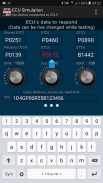
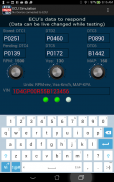

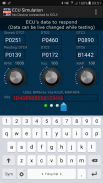
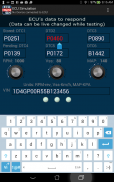

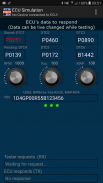
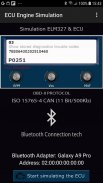
ECU Engine Sim

Description of ECU Engine Sim
The ECU Engine Simulation is an application designed for Android devices that transforms a smartphone or tablet into a virtual car's Engine Control Unit (ECU) for testing purposes. This app is particularly useful for developers and testers working with OBD-II (On-Board Diagnostics) systems. By utilizing the capabilities of an OBD-II Bluetooth adapter, users can simulate a vehicle's ECU without the need for a physical car. This app serves as a cost-effective solution for those involved in OBD-II software development and testing.
After downloading the ECU Engine Simulation, users can initiate the simulation process with a simple tap on the “Start simulating the ECU” button. This action activates the data server function of the app, allowing it to listen for incoming data requests. The application efficiently processes commands and responds to requests from external testers by emulating the OBD-II standard, specifically ISO 15765-4 CAN at a speed of 11/500Kb.
The ECU Engine Simulation supports a variety of AT commands that are essential for interacting with the simulated ECU. Notable commands include ATZ, ATWS, ATSP0, and several others that facilitate the initialization and configuration of the OBD-II connection. These commands are critical for establishing communication between the Android device running the ECU simulation and the external OBD-II testing app.
Once the OBD-II adapter is initialized using the supported AT commands, users can send various OBD-II requests. This includes live data Parameter IDs (PIDs) such as 01 00, 01 01, 01 05, and numerous others that provide real-time vehicle data. Users can also request vehicle information, including the VIN number and calibration number, by utilizing specific service mode commands like 09 02 and 09 04.
In addition to live data and vehicle information, the ECU Engine Simulation allows users to manage Diagnostic Trouble Codes (DTCs). Users can request stored trouble codes with the command 03, check for pending codes using command 07, and even clear trouble codes and related stored data with command 04. This functionality is crucial for diagnosing potential issues during the development and testing phases.
The application also supports freeze frame data, which provides a snapshot of critical vehicle parameters at the time a fault occurs. Users can request supported PIDs for freeze frame data and retrieve the specific data related to the DTC that triggered the freeze frame event. This feature is beneficial for understanding the conditions under which a fault was recorded, aiding in troubleshooting efforts.
For those utilizing the ECU Engine Simulation, it is important to note that it has been tested with various Android OBD-II apps, including Code Reader Pro, Torque Pro, DashCommand, and ELMScanToyota. The testing results have been favorable, indicating that the simulation runs reliably and is stable during interactions with these applications. However, users should be aware that some OBD-II apps may face connectivity challenges due to differences in Bluetooth threshold detection between real ELM adapters and the Android devices.
The ECU Engine Simulation is particularly advantageous for developers who want to test their applications safely indoors before conducting tests with a real vehicle. This allows for thorough preparation and troubleshooting, reducing the need for time-consuming adjustments during real-world testing scenarios. The convenience of simulating an ECU at home offers a unique opportunity for developers to refine their applications.
Privacy considerations are addressed by the app, which maintains a clear privacy policy to inform users of data handling practices. This transparency is essential for users who prioritize their privacy while utilizing the app for development and testing purposes.
In summary, the ECU Engine Simulation offers a unique platform for Android users looking to simulate an ECU and perform OBD-II testing without a physical vehicle. With its comprehensive support for various AT commands, live data PIDs, vehicle information requests, and DTC management, this app meets the needs of developers and testers in the automotive software field. The ability to run the simulation indoors enhances the testing experience, making it a valuable tool for anyone involved in OBD-II software development.
Privacy policy: https://www.freeprivacypolicy.com/live/4d959ed7-c0fd-4da4-8da1-98d09d46161f


























